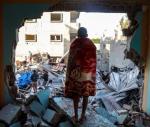You are here
Hot summer in Palestine
Jun 13,2019 - Last updated at Jun 13,2019
Palestinian Prime Minister Mohammad Shtayyeh told The New York Times that he expects this summer to be a hot one and he was not referring to the weather. The interesting thing was that President Mahmoud Abbas, who has been reluctant about the idea of ending security coordination with the Israelis, echoed the same sentiments in a Tweet on June 5 saying: “The financial crisis is getting difficult and the months of July and August will be the most difficult. If the situation is not solved, we will begin to lay off members of the security because of our inability to cover their pay.”
The idea of stopping or cutting back on security coordination is not new. The Palestinian National Council had already resolved last April that the security coordination with Israel must end now that the Oslo Accords have run their course, with Palestinians blaming Israel for regularly violating its terms. In fact, Israeli forces forcefully entered Nablus on Monday night in clear violation of the supposed sovereignty of areas demarked as areas A under the full administrative and security control of the Palestinian government.
Many have argued that Mahmoud Abbas would not dare end coordination with Israel, knowing full well that his government and his own life will be threatened if that was to happen. It is hard to predict whether the talk of the top Palestinian leaders a bluff or if it is serious. If President Abbas had not repeated the threats made by his prime minister, one could have argued that he was waiting to see the reaction, but Abbas’s Tweet on his official account makes it clear that the Palestinian leadership is serious.
It is not clear what Abbas and Shtayyeh expect to happen. Everyone knows that Israel’s hands, politically speaking, are tied until the September 17 renewed elections. It is also unclear whether any Israeli government can easily ignore a law passed by the Knesset forcing the government to cut from Palestinian funds an amount equivalent of what is paid to families of prisoners and martyrs. Ironically, the Palestinian leadership’s hands are similarly tied because the issue of supporting the families of Palestinian prisoners and martyrs, many of whom were killed by Israel, is guaranteed in the Palestinian basic law. Israel and the US have been aware of this clause in the basic law since the 1990s, without either complaining until recently.
It is possible that the Palestinian leadership is hoping that the crisis mood will provide some solutions, including the possibility that Arab states, which made the safety net commitment to Palestinians as late as a month ago to pay $100 million a month, would carry out that promise. As ironic as it may sound, it appears that Palestinians sometimes need to go through the US or Israel to obtain the implementation of a promise made in an Arab League setting.
The hot summer issue is also connected to the upcoming economic workshop. Although planned for June 25, there are many who doubt that this event will take place in Bahrain on the scheduled dates, with Palestinian officials and businessmen publicly saying they will not come, and several Arab countries not committing yet to attending the Manama workshop. Israel, which no doubt is eager to go to any Arab capital that welcomes it, has yet to be invited.
While the focus of the Palestinian government continues to be on economic issues and the refusal to accept what they call Israeli theft of Palestinian money, the leadership has had to deal with another problem. It appears that in the aftermath of the exit of Rami Hamdallah’s government, a number of embarrassing documents have been leaked. The documents show that the Palestinian president approved a secret request from Hamdallah’s government to retroactively increase the salaries of the government, and to give them a hefty $10,000 expense for housing.
Another reportedly embarrassing document is a letter to Abbas from Rafiq Natsheh, head of the anti-corruption commission, stating that he had documents pertaining to a powerful minister having accepted bribes. Abbas kept the letter and apparently did nothing against the corrupt powerful minister. It is not clear if these leaks come from Palestinian sources or from Israeli ones. Nevertheless, they do show that the presidency and the government, which operates without the checks and balances of an elected parliament, tend to abuse their powers without the people having a say as to whether they should stay in or leave their positions.
Add to all that the issue of the succession of an 84-year-old president who has been in his position without a vote from the people for far too long.
The hot summer that Shtayyeh has promised might not affect Israel alone, as certain Palestinian elements could also get their fingers burnt in the process.













